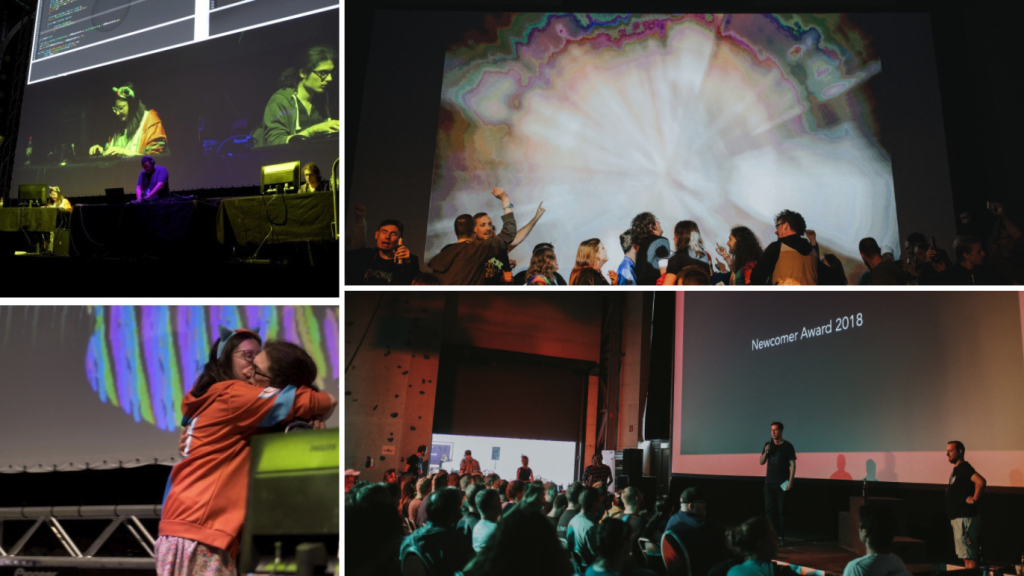Demoscene nominated as intangible UNESCO cultural heritage in Germany

Cologne, 21. 04. 2020 – The Cologne-based association Digitale Kultur e.V. has made it. For the first time, the demoscene as a digital cultural form has been nominated by the UNESCO in NRW for the UNESCO lists of intangible cultural heritage in Germany. Further hurdles still have to be overcome, the final confirmation at the federal level is due at the beginning of 2021.
> Please find German version of article below
As the Ministry of Culture and Science in North Rhine-Westphalia announced at the end of last week , the demoscene was nominated for inclusion in the national German UNESCO cultural heritage register. Together with three other cultures, the jury selected the demoscene as worthy of recognition from a total of 18 applications.
After the landmark decision in Finland last week, in which the demoscene was recognized as a Finnish national UNESCO cultural heritage, the decision in Germany is another success for the Art of Coding campaign, under whose umbrella similar applications are currently being prepared in other countries.
What is the demoscene?
Since the beginning of the home computer era in the early 1980s, the demoscene has been a playground for border crossers and creative explorers of the digital revolution. It is especially dedicated to the production of software-generated music videos, which are completely generated in real time by self-created programs. Beginning in the 80s, with so-called intro-videos before cracked games, the art and culture of the scene has constantly evolved, and since the 90s it has been living out its skills in independent audiovisual real-time animations to bend the rules of hardware and software. On one hand, the demoscene is a global phenomenon and has influenced many other digital contexts, on the other hand, there has always a been a strong element of a regular physical culture at the scene’s meetings. For decades the demoparties function as regular gatherings and have formed a place for exchange, living out and further development of one’s own culture.

Historical decision as a belated Easter gift
Especially after Revision – world’s largest gathering of demosceners, traditionally taking place over Easter – had to be moved to the internet as no physical demoscene-party was allowed, the nomination of the demoscene for the nationwide list is a great belated Easter present.
The fact that the German jury experts were aware of the historical significance of their decision is suggested by the notification of nomination: “As the ‘demoscene’ in North Rhine-Westphalia is the first cultural form from the field of digital culture to be proposed for inclusion in the nationwide directory, the state jury for the Intangible Cultural Heritage in North Rhine-Westphalia discussed the application intensively.”
Digital cultural heritage
Tobias Kopka, from the Cologne-based applicant Digitale Kultur e.V., responsible for the application in Germany and the community work of the overarching Art of Coding initiative, is enthusiastic: “The demoscene is the first time a digital culture has been nominated for the nationwide list of intangible UNESCO cultural heritage. For decades, the demoscene has been a technical-creative cultural community that transcends all borders – and sees itself as transnational in the best sense of the word. And the application not only drives the discussion about the demoscene, but also in a broader sense about contemporary inclusion of all digital cultural forms into the canon of cultural preservation and promotion.
Andreas Lange from EFGAMP e.V., who is responsible for the coordination of the international applications at Art of Coding, is particularly pleased with the jury’s understanding in their notification that ‘in addition to technical excellence, a strongly internationally oriented sense of community is one of the scene’s identification factors’. “Because the demoscene has been international as a digital culture from the very beginning, any national recognition is an important milestone, as it increases the chances of having the demoscene recognized internationally. Since the demoscene has developed substantially in Europe, this is also an opportunity to name a decidedly European cultural practice which, as digital, is inseparably linked to current and future cultural and social conditions.”
Community feeling and collective effort
Tobias Kopka: “The point is to make it clear that digital culture can function in a decentralized, self-organized, anonymous and competitive way – and still create a strong sense of belonging and a community with special knowledge, stories and traditions. After 30 years that could be called digital customs, but at the same time it is still constantly evolving. Many of the classical definitions of culture reach their limits here. And this community experience is not only expressed in the support of many demogroups, demoparties and individuals of the scene – the positive feedback we receive fortunately goes far beyond that of the demoscene. This is great and we are happy about every support, because the initiative is just starting!”
It will remain tense at least until the beginning of 2021, as two further hurdles still have to be overcome – confirmation by the Conference of Ministers of Education and Cultural Affairs and examination by an independent commission of experts at federal level. And if all this has worked out, then the start of a transnational application is on the agenda, which all countries that have included the demoscene in their national cultural heritage can then join.
The initiators Kopka and Lange are optimistic: “The time is right for the demoscene to become included in the living UNESCO cultural heritage register in Germany as first digital cultural practice ever”.
Köln, 21. 04. 2020 – Der Kölner Verein Digitale Kultur e.V. hat es geschafft. Erstmalig wird mit der Demoszene von der UNESCO in NRW eine digitale Kulturform für die Listen des lebendigen UNESCO Kulturerbes in Deutschland nominiert. Weitere Hürden sind noch zu nehmen, die finale Bestätigung auf Bundesebene steht Anfang 2021 an.
Wie das Ministerium für Kultur und Wissenschaft in Nordrhein-Westfalen Ende letzter Woche bekannt gab, wurde die Demozene für die Aufnahme in das nationale Deutsche UNESCO Kulturerbeverzeichnis nominiert. Zusammen mit drei anderen Kulturen wählte die Jury aus insgesamt 18 Anträgen die Demoszene als anerkennungswürdig aus.
Nach der wegweisenden Entscheidung in Finnland von letzter Woche, in der die Demoszene als nationales Finnisches UNESCO Kulturerbe anerkannt wurde, ist die Entscheidung in Deutschland ein weiterer Erfolg für die Art of Coding Kampagne, unter deren Schirm derzeit auch in anderen Ländern ähnliche Anträge vorbereitet werden.
Was ist die Demoszene?
Seit Beginn der Heimcomputer-Ära in den frühen 1980ern ist die Demoszene Spielort für Grenzgänger und Kreativ-Explorer der digitalen Revolution. Sie hat sich insbesondere der Produktion von softwaregenerierten Musikvideos verschrieben, die in Echtzeit vollständig durch selbstgeschriebene Programme generiert werden. Beginnend in den 80ern, mit sogenannten Intro-Vorspännen vor geknackten Spielen, hat sich die Kunst und Kultur der Szene beständig weiterentwickelt, um seit den 90ern in eigenständigen audiovisuellen Echtzeit-Animationen ihr Können abseits vorgegebener Regeln von Hard- und Software auszuleben. Einerseits ist die Demoszene ein globales Phänomen, das viele andere digitale Kontexte mit beeinflußt hat, andererseits aber immer auch eine regelmäßig ganz physische Kultur auf den Treffen der Szene. Denn seit Jahrzehnten bilden die Demopartys als regelmässige Zusammenkünfte einen Ort zum Austausch, Ausleben und Fortentwicklung der eigenen Kultur.

Historische Entscheidung als verspätetes Ostergeschenk
Gerade nachdem die Revision, die traditionell an Ostern stattfindende, weltgrößte Zusammenkunft von Demoszenern, ins Internet verlegt werden musste, ist die Nominierung der Demoszene für die bundesweite Liste ein großartiges verspätetes Ostergeschenk.
Dass sich sich die deutschen Jury-Experten der historischen Tragweite ihrer Entscheidung bewusst gewesen sind, legt der Nominierungsbescheid nahe: „Da mit der ‘Demoszene’ in Nordrhein-Westfalen erstmalig eine Kulturform aus dem Bereich der digitalen Kultur für die Aufnahme in das Bundesweite Verzeichnis vorgeschlagen wurde, hat die Landesjury für das Immaterielle Kulturerbe in Nordrhein-Westfalen die Bewerbung intensiv diskutiert.”
Digitales Kulturerbe
Tobias Kopka, vom Kölner Antragsteller Digitale Kultur e.V., verantwortlich für den Antrag in Deutschland, sowie die Community-Arbeit der übergreifenden Art of Coding Initiative, ist begeistert: „Mit der Demoszene wird erstmalig eine digitale Kultur für das bundesweite Verzeichnis des immateriellen UNESCO Kulturerbe nominiert. Die Demoszene setzt sich als technisch-kreative Kulturgemeinschaft seit Dekaden über jedwede Grenzen hinweg und versteht sich im besten Sinne als transnational. Der gemeinsame Antrag treibt die Diskussion um einen zeitgemäßen Einbezug aller digitalen Kulturformen in den selbstverständlichen Kanon der Kulturbewahrung und -förderung voran.”
Über das Verständnis der Jury im Nominierungsbescheid, dass ‘neben der technischen Exzellenz ein stark international ausgerichtetes Gemeinschaftsgefühl zu den Identifikationsfaktoren der Szene gehört’, freut sich besonders Andreas Lange von EFGAMP e.V., der für die Koordination der internationalen Anträge bei Art of Coding verantwortlich ist. “Weil die Demoszene von Anfang an als digitale Kultur international war, ist jede nationale Anerkennung ein wichtiger Meilenstein, da so die Chancen steigen, die Demoszene auch international anerkennen zu lassen. Da sich die Demoszene wesentlich in Europa ausgeprägt hat, ist dies auch eine Gelegenheit, eine dezidiert Europäische Kulturpraxis zu benennen, die als digitale untrennbar mit den heutigen und zukünftigen kulturellen und gesellschaftlichen Gegebenheiten verknüpft ist.”
Gemeinschaftsgefühl und kollektive Anstrengung
Tobias Kopka: “Es geht darum, deutlich zu machen, dass digitale Kultur dezentral, selbst-organisiert, anonym und wettbewerbsorientiert sein kann, und dennoch ein starkes Zusammenhörigkeitsgefühl und eine Community mit besonderem Wissen, Geschichten und Traditionen entstehen kann, die man als digitales Brauchtum bezeichnen könnte, sich gleichzeitig aber permanent weiterentwickelt. Viele der klassischen Kulturbegriffe kommen hier an ihre Grenzen. Und diese Gemeinschaftserfahrung drückt sich nicht nur in der Unterstützung vieler Demogruppen, Demopartys und Einzelpersonen der Szene aus – die positiven Rückmeldungen, die wir erhalten, gehen erfreulicherweise weit über die der Demoszene hinaus. Das ist klasse und wir freuen uns über jede Unterstütung, denn es geht ja gerade erst los!”
Spannend bleibt es mindestens bis Anfang 2021, da noch zwei weitere Hürden genommen werden müssen – die Bestätigung durch die Kultusministerkonferenz und die Prüfung durch eine unabhängige Expertenkommission auf Bundesebene. Und hat all das geklappt, dann steht der Beginn eines transnationalen Antrages auf dem Plan, dem sich dann alle Länder anschließen können, die die Demoszene in ihr nationales Kulturerbe aufgenommen haben.
Die Initiatoren Kopka und Lange zeigen sich optimistisch: „Die Zeit ist reif, dass mit der Demoszene die erste digitale Kulturform ins lebendige UNESCO Kulturerbe in Deutschland aufgenommen wird“.
Resources:
Source featured image : Liveshader Competition at Evoke, combattants in picture Flopine and Nusan (Cologne, 2019), Photo: Darya Gulyamova,
For questions or support contact the Art of Coding initiative here.
Application text to UNESCO in Germany: PDF here.
Digitale Kultur e.V.: https://www.digitalekultur.org
Revision: https://2020.revision-party.net/
Evoke: https://evoke.eu/
See all partners & supporters (constantly growing, get in touch!): here.

The future of website creation is here.
With Genesis and Atomic blocks, you can build beautiful, powerful websites in minutes with our robust theme framework and professionally-designed sections and layouts
